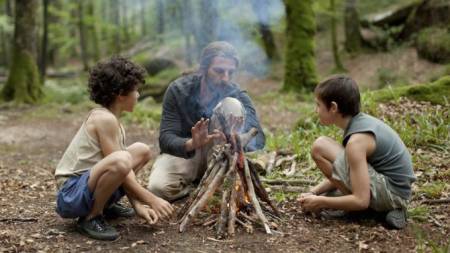 Not so wild
Not so wildThis film, featuring one of director and actor Matthieu Kassovitz's more extensive roles in recent years, is a free adaption of the real-life story of Xavier Fortin, who became an outlaw for over a decade hiding with his two sons when his wife broke with their back-to-nature lifestyle and won a custody battle for the boys, and he refused to comply. I refer the reader to my review of another French film dealing with the same material, Jean Denizot's
The Good Life/La belle vie (FCN 2014; released in France April 2014).
The French critics seem to prefer the Cédric Kahn film. Neither is an exact depiction of the events, which may be in dispute since the wife's account and the husband's differ. I think Denizot's film makes more sense, and shows more of the positive side of the boys' life in nature with their father. Both films use two sets of actors for the sons, for when they are seven and eight and when they are teenagers.
In Cédric Kahn's film, Carole and Philippe (Céline Sallette and Mathieu Kassovitz) bonded because both had tired of propriety and consumerism and renounced civilization and chosen to live off the land. Calling themselves Nora and Paco, they have led a semi-nomadic life in a caravan, eventually having three sons. But Nora has tired of their itinerant lifestyle; and, wanting to give her their sons a conventional education and more of an opportunity to function in the world, she gains custody. But when Philippe comes to Nora/Céline's parents' house, the two younger boys escape and run off with their father, the oldest remaining behind.
The two younger boys are seven and eight when this happens, and the father takes them on the run, hiding from police, trying to continue living in nature and home-schooling the boys. This goes on for over a decade, whereupon both the boys begin to get fed up with the limitations of their life, and the father gets caught.
In Denizot's film, the boys and their father are largely on their own, and the positive side of the experience comes through better. In Kahn's film, there are a lot of times when the trio are living with hippies or punks, on the edge of a farm, and some chaos and conflict ensue. In Denizot's film, a change comes when the older boy meets a girl and falls in love with her, and finds a job, and leaves to be with her. The fugitive life has prevented him from experiencing sex, and he wants to have his own car and funds. In both films, conflicts eventually arise between the boys and their father.
Kahn takes us to the period when the father is arrested and the boys, seeking to gain his release, are confronted by their mother, who hasn't seen them for all these years. Even more than in her role of Jean Dujardin's spouse in
The Connection, Céline Sallette plays a borderline hysterical, shrill wife. Her emotionality may be effective, but it's grating.
In my review of Denizot's film, I mention Sidney Lumet's moving 1988 film
Running on Empty, featuring River Phoenix, which does not have spouses in conflict, but is also about a family on the run from authorities, moving from place to place and concealing their identity, and also involves an older son who reluctantly has to choose, in the interests of personal fulfillment, to break away from his fugitive family. The
Running on Empty family are living in suburbs and cities, so living in nature isn't involved. But
Running on Empty works better than these two French films, perhaps for the latter reason. It seems difficult to represent both the appeal of living in nature away from civilization while simultaneously showing a fugitive existence. The two work against each other. It becomes too complicated. In the case of Kahn's film, the action simply becomes too chaotic. In the focus on authentic milieux, one loses contact with where they are and what is gong on.
Nonetheless, Cédric Kahn's
Wild Life has been perhaps the best critically received of all his films, and it won a special jury prize at the San Sebastian International Film Festival. Certainly this theme is a fascinating one.
Wild Life/Vie sauvage, 102 mins., after its San Sebastian debut, showed at a handful of other festivals and had its French theatrical relase 29 October 2014 (AlloCiné press rating 3.9.). The 2010 Rendez-Vous featured Cédric Kahn's
Regrets. The director's 2004 adaptation of Georges Simenon's tense short novel
Red Lights/Feux rouges is also worth watching.





